|
This Earth Day let’s make it about our favorite 70 percent- the ocean. As scuba divers, we are the fortunate few that get to experience its beauty. Beneath the waves we are exposed to a whole other world, one most of us share a common love for... It's beautiful, but it needs to be protected. The colourful coral cannot defend itself from damaging chemicals. The sharks cannot defend themselves from their human predators. Whales cannot defend themselves from the plastic they are mistakenly consuming. The ocean cannot protect itself from us. We are too technically advanced- too comfortable with our current practices. The inconvenience that comes with wanting to eliminate the ocean’s threats scares people. To many, it seems unachievable and unrealistic... But when you find worth in something, anything is achievable. Our love for this magical place covering a vast majority of our Earth can go as far as we wish.
The day I arrived back from my first scuba diving excursion, was the day my family agreed to stop using plastic bags. After discovering that sea turtles often mistaken these bags for their favorite treat, jellyfish, I was devastated. That was the start to my journey of protecting the ocean, and all it took was exposure and understanding. The exposure created a bond... The ocean became my safe place, and I wanted to return the favor. My generation of divers will see it. Over time, we'll notice the differences. We'll remember the ocean how it was, and live through what it will become. We'll remember the creatures we've seen, that will no longer be with us. We'll remember the colors of the coral, that will bleach overtime. We'll remember taking a giant stride through the blue waves, that will fill with beds of floating plastic. We will remember it, we will see it, and we will live through it- if it doesn't change. Every article I've read and every petition I've signed, will make a difference. Every plastic bag I've refused and every straw I've avoided, will make a difference. Every photo or video I've posted of the beauties of our deep blue sea, will make a difference. My voice and yours, will make a difference. No single person can doing everything there is to protect the ocean, but all together, each of us can do what we can until the ocean’s threats are eliminated. I personally believe, that one of the simplest actions you can take as a scuba diver to protect our ocean is sharing your voice and ideas. The ocean’s biggest threat is the belief that someone else will save it. Spreading your voice, opinions, and ideas is the best way to spread awareness and suggestions to those that are not yet on board with the movement of protecting our water. - EARTH DAY ANNOUCEMENT - Finally... Adventure Sports is happy to announce that this summer we will be putting together an Eco-Dive Club! Our hope is to create a group of divers with a strong passion to save the ocean, who will have opportunities to arrange different fundraisers and events, geared towards supporting Project Aware's efforts to protect underwater environments and species. Monthly meetings will consist of brainstorming creative ideas and putting together interactive activities for other divers to participate in. Our job will be to engage as many people as possible in the steps towards a healthy, happy ocean... The sky is the limit! As we continue to expand, with a new location in the near future, we wish to also expand our impact. We are a dive shop that values all that's living within all waterways. We pledge to protect our ocean by doing what we can moving forward, starting with this. We need your creativity, your ideas, your passion and most importantly your love for the water. If "Ocean Activist" screams your name, this club will offer you the chance to expand just how much you can do! Contact the shop for more information on getting onboard.
1 Comment
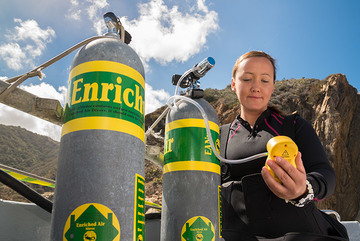 PADI Enriched Air Diver PADI Enriched Air Diver Enriched Air (often referred to as Nitrox) can enrich your diving experience, and I have found it especially beneficial on dive vacations, when I am adventuring beneath the waves on multiple dives every day. As with anything, there are risks involved with using enriched air, but those risks are easily mitigated once you know what they are. For this reason, dive shops will not fill your tanks with Enriched Air unless you can prove you have successfully completed the Enriched Air course. Air is comprised of 21% oxygen, and roughly 79% nitrogen (included are waste gases and other trace elements, but nitrogen comprises the lion’s share of the remaining gas portion). You know that when compressed gas enters our tissues, they become increasingly saturated with nitrogen as the dive progresses, and therein lay the struggle that occupies the minds, and fills the course content of scuba divers and the educational curriculum of this sport. Our safety stops at the end of a dive (3 minutes at 5 metres or 15 feet) give our bodies a little extra time to off-gas that nitrogen from our tissues at a safe, slow rate. When diving enriched air, the higher oxygen content, translates into lower nitrogen content, meaning our bodies are absorbing less nitrogen throughout the dive to begin with. What does that mean to us? 1. Enjoy a longer allowable bottom time (YAY!). You can extend your "No Decompression Limits" with recreational enriched air, because you are reducing your nitrogen absorption. Take a look at the chart above. Diver #1 on 36% enriched air can dive for over 200 minutes at a depth of 50 ft. Diver #2 breathing air can only dive for 70 minutes. That's a big difference! What I like about that, is that I often finish my dive long before I reach those time limits, so my nitrogen levels are much lower. Awesome! Review: Your "No Decompression Limit (NDL)" is the time limit for the length of time you can stay at a given depth safely, without requiring mandatory decompression stops (only for tech divers with specialized training and equipment). A recreational diver should never have to do a decompression stop, but if you accidentally exceed your recreational limits on a dive, and your computer tells you to make a decompression stop, do it! 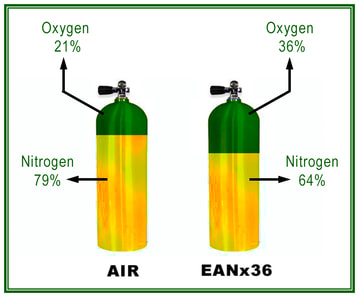 2. Enjoy shorter surface intervals. Again, you are absorbing less oxygen, so your off-gassing time will be shorter; yes you will be back in the water sooner than your air-sucking friends! 3. Enjoy longer repetitive dives. I know, it is a common theme, but because you are reducing your nitrogen intake and absorption, you can enjoy longer multiple dives than if you were only breathing air! I find enriched air particularly beneficial on a scuba vacation, especially scuba liveaboards! 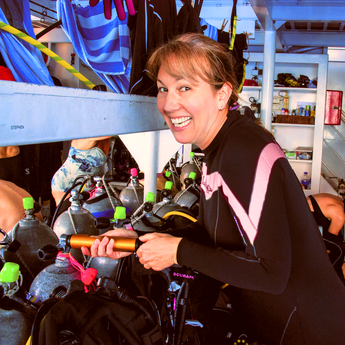 Analyzing my nitrox tank before a dive on the AquaCat liveaboard. Analyzing my nitrox tank before a dive on the AquaCat liveaboard. Side anecdote: Annie and I were on a scuba liveaboard earlier this year. We were both diving 32% enriched air, and Annie was using 2 dive computers, her main one, and her new back-up computer. On the second day, on an afternoon dive, she heard a computer alarm going off, and checked her main computer, which reported that she was fine (it was not making any noise). She assumed it was another diver's computer, and resumed her dive. Later, while we were eating cookies and drinking Norm's famous ginger-tea during our surface interval, she discovered, looking at her computers, that it was her back-up computer. Her main computer was set to 32% enriched air, but her new back-up computer was still set to air (she had forgotten to set it to nitrox). It had been warning her that her safe minutes were almost up, and it was time to end the dive. It just goes to show, that if she were diving air, her subsequent dives were going to become shorter and shorter to keep her nitrogen at a safe level. We did about 4 dives a day on that trip for 9 days, so enriched air (or Nitrox) was a must for me! 4. Feel Energized! Although PADI says there is no scientific proof to show that you feel less exhaustion and more energy when breathing higher levels of oxygen, nitrox divers will often swear to you that they feel less tired after a dive, and have more energy. Who knows? Judge for yourself. What will I Learn on the PADI Enriched Air course? You will learn why diving with air that has higher oxygen and lower nitrogen content gives you more bottom time, along with enriched air equipment considerations. During a practical session, you will:
The PADI enriched air course is one of the most popular courses in the program, because scuba diving with enriched air nitrox gives you more no decompression time, especially on repetitive scuba dives. If staying down longer and getting back in the water sooner sounds appealing, then don’t hesitate to become an enriched air diver. When is the NEXT PADI Enriched Air Diver Course? Click on our Calendar of Events below, to see courses and trip schedules,
or call 905-898-5338 to talk to an associate today. The class runs in one evening, so it is easy to accomplish - let us know when you want to take the course, and we can try to accommodate you! Found in the Pacific and Indian Oceans. The Fang Blenny is a fascinating little guy. He is often referred to as a "mimic blenny", as he fools his victims into believing he is just another cleaner fish, mimicking the swimming habits of the bluestreak cleaner wrasse, and hanging around cleaning stations, waiting for the next unsuspecting client. As a larger fish comes into a cleaning station to have parasites cleaned from its body and even inside its mouth, the fang blenny aggressively attacks and bites a chunk of scales, skin, and/or flesh, then beats a hasty retreat. How does he get away with it? A fang blenny does indeed have fangs, as his name would imply, and victims are injected with an opioid venom that both numbs the bite somewhat, and lowers their blood pressure, making their reactions slow and clumsy. What a nasty little fellow! Don't let that happy smile on his face fool you, they have been known to bite divers too! I guess I should be happy that the fang blennies I encountered were wary of my presence, and retreated into their holes until I was gone! Next Dive Against Debris scuba event:
June 2, 2019 10:00 am Bonnie Boats, Jackson's Point |
FlickrAlbumAuthorsJill Smith Archives
January 2024
Categories
All
|
Our Services |
Company |
SupportOur Blog
|
|
Copyright © 2014
|
Newmarket, ON
|
(905) 898 5338
|

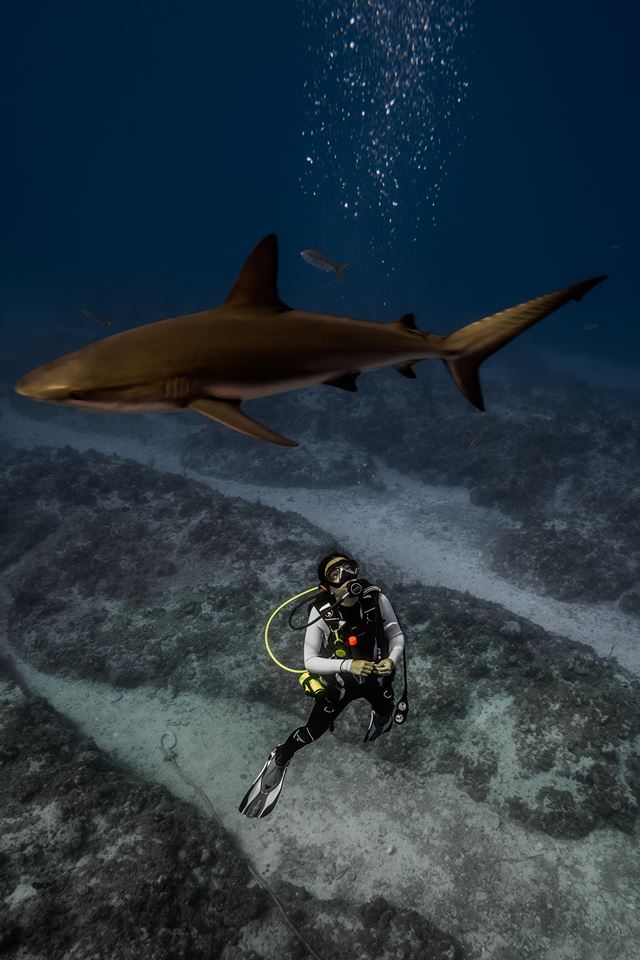
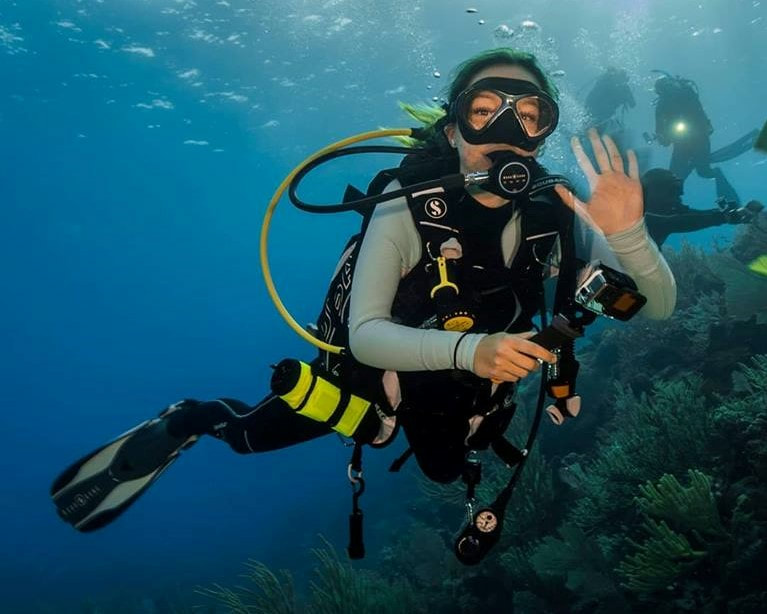
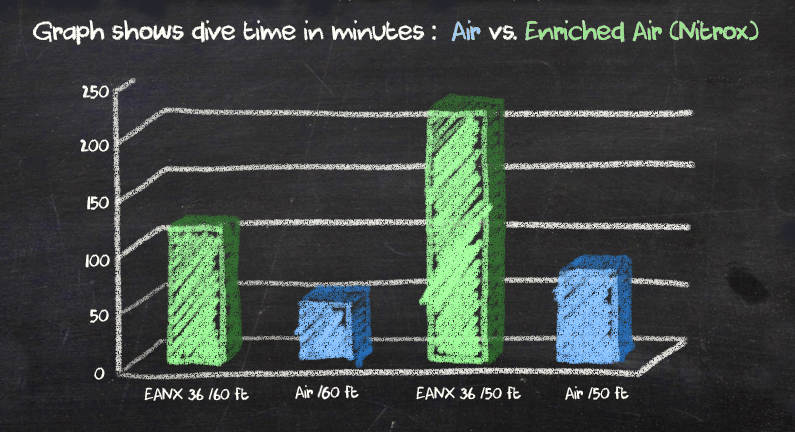
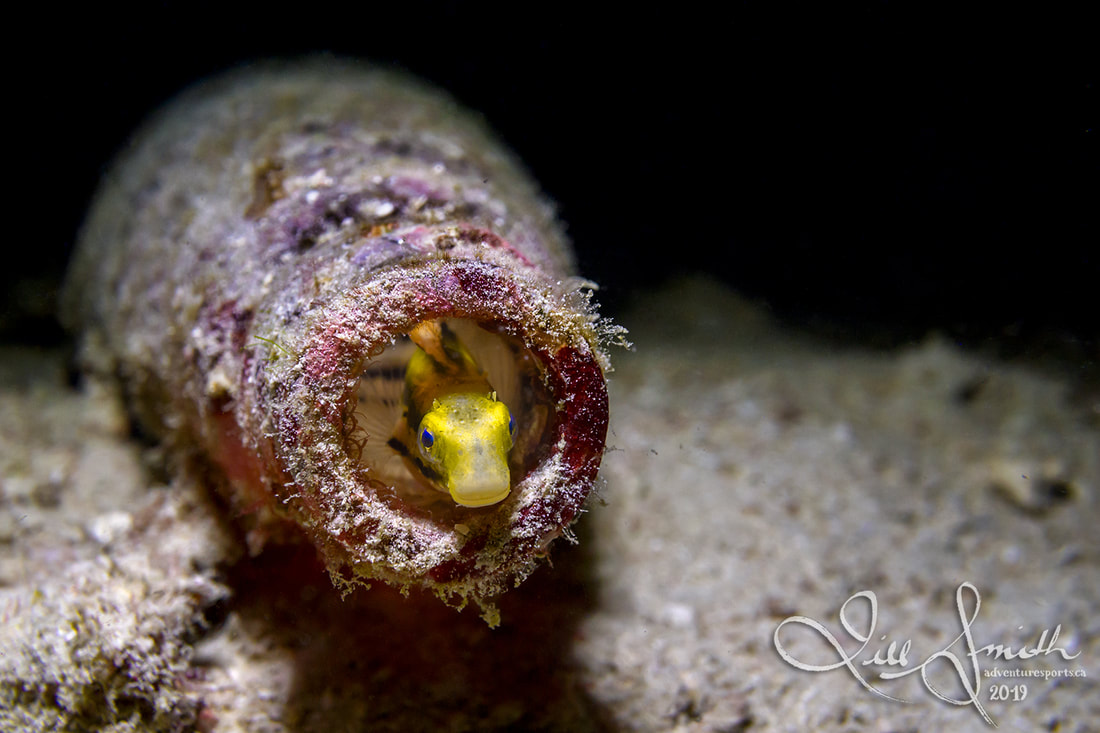
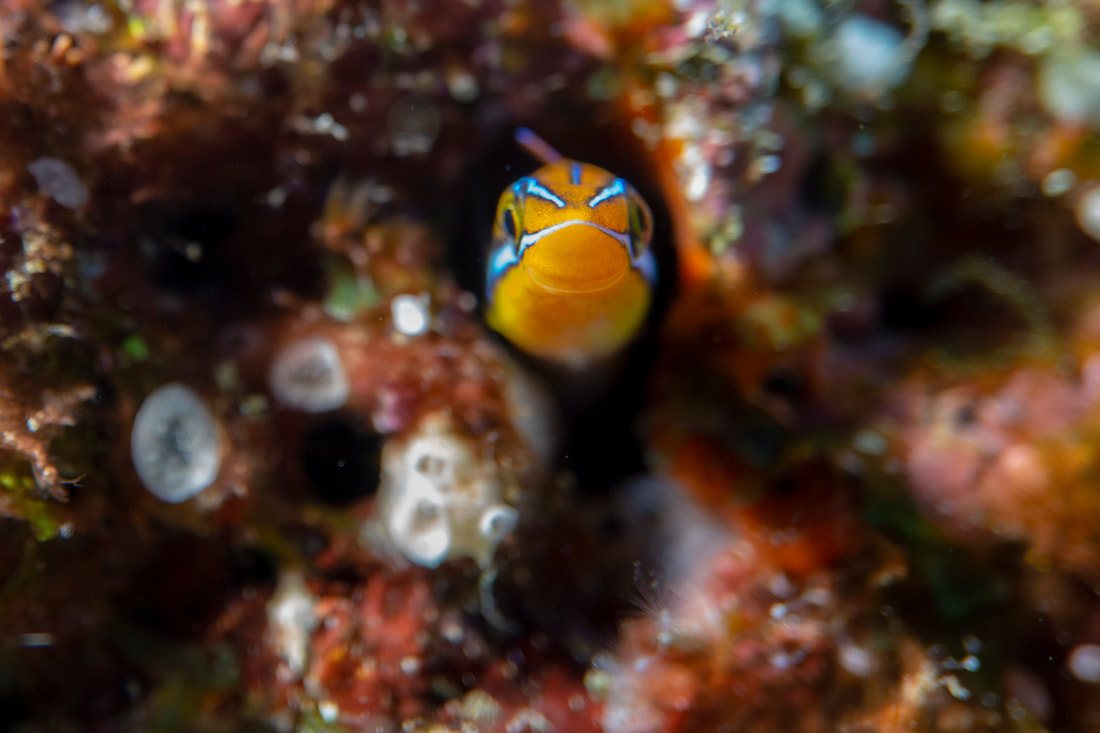

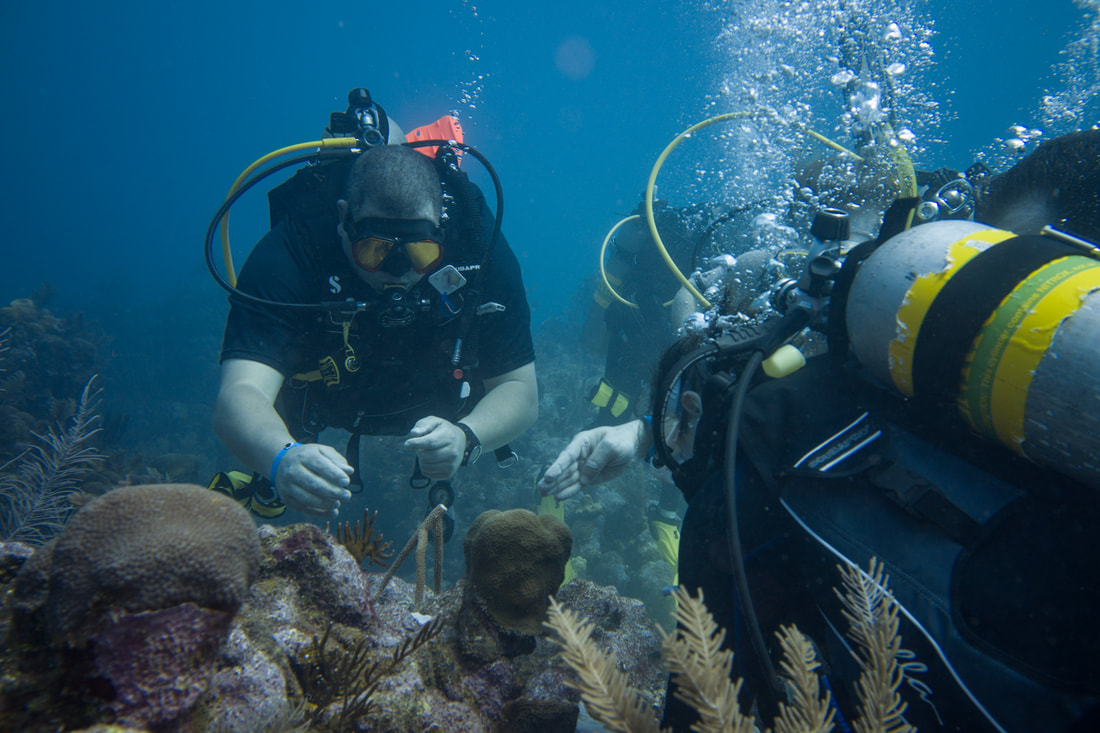
 RSS Feed
RSS Feed

